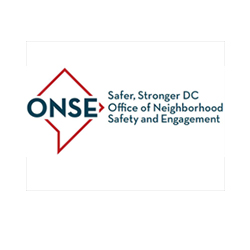Staff Training

2022 DC Debates
October 1, 2022
Strategic Communications Support
March 23, 2023Bayne was engaged by the DC Office of Neighborhood Safety and Engagement (ONSE) to conduct a 2-day staff training program for 20 staffers from the ONSE leadership academy covering Trauma Informed Care and de-escalation techniques.
Trauma Informed Care and Systems
Provided training on the impact and consequences of childhood trauma and adversity on the lives of youth and families:
- Participants learned how to identify different types of trauma and adversity, and understand common reactions to trauma.
- Participants explored the short- and long-term consequences of trauma on brain development.
- Participants gained helpful strategies for working with and interacting with youth who have been impacted by trauma.
- Participants learned how to build meaningful partnerships that create mutuality among children, families, caregivers, and professionals, both at an individual and organizational levels.
- Participants gained an understanding of the intersections of trauma with culture, history, race, gender, location, and language, how to address the compounding impact of structural inequity, and how to be responsive to the unique needs of diverse communities.
- Participants gained an understanding of achieving more successful and meaningful outcomes of care through partnerships among family, youth, and providers.
- Participants explored the impact of working with youth who have experienced trauma, the common situations that put professionals at risk of experiencing vicarious trauma, secondary traumatic stress, and compassion fatigue; and gained an understanding of the risk and resilience factors that can increase their risk of, or protect them against, such impacts.
De-escalation without Physical Contact
Participants gained insights and learned about tools to help them handle emotionally escalated employees, coworkers, or customers through understanding the psychology of conflict and aggression, was well as its underlying causes and self-regulation tactics.
- Participants learned to recognize early warning signs associated with different types of aggressive behavior in order to understand the individual’s needs before the situation escalates.
- Participants learned self-regulation techniques to manage their own emotional needs order to neutralize the risk and prevent escalation.
- Participants learned calming techniques for slowing down intense emotional reactivity in themselves and others.
- Participants learned approaches for handling people who are in a combative state, including communication skills to help extinguish threats and connect with an aggressive individual on a calmer basis.
- Participants engaged in teambuilding exercises focused on verbal de-escalation practices to help develop a culture of trust and support among staff members. De-escalation tactics covered include:
- Being respectful of personal space
- Being mindful of body language (facial expressions, movements, gestures
- Avoiding judgement
- Using positive self-talk
- Ignoring authority challenges
- Allowing silences
- Providing positive choices




